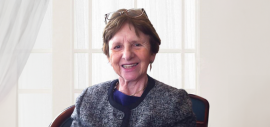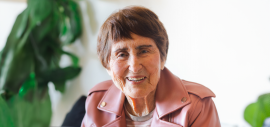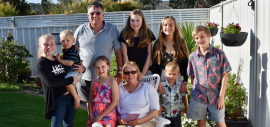Blog: The Brain Dialogues, filtered by tag: Dementia
Better Brains, Better Bodies, Better Ageing
HEIDI DOUGLASS | h.douglass@unsw.edu.au
More than 500 seniors filled the auditorium at The Juniors in Kingsford to discover the intrinsic links between their brains, bodies and better ageing. The annual event held on 25 October, was hosted by South Eastern Sydney Local Health District’s Older Persons’ Mental Health Service, in partnership with Randwick City Council and the Centre for Healthy Brain Ageing (CHeBA).
With people over the age of 65 now outweighing people under the age of 15, the theme of this year’s public event was Better Brains, Better Bodies Better Ageing, which enticed… Read More
Advocates for healthy ageing through Sydney Marathon
HEIDI DOUGLASS | h.douglass@unsw.edu.au
In a bid to address the escalating number of people living with dementia, PJ Lane - son of TV legend Don Lane – and four corporate teams took on this year’s Sydney Marathon, raising much needed dollars for dementia research while promoting the benefits of physical activity throughout life to reduce risk of dementia.
CHeBA Ambassador PJ Lane ran his first ever Marathon and led the charge as highest individual fundraiser with $9,279 raised for research.
Senior executives from Henry William Lawyers, Luna Partners, Integrated Portfolio Solutions and… Read More
Keys to Better Ageing: Free Seniors Event
HEIDI DOUGLASS | h.douglass@unsw.edu.au
The South Eastern Sydney Local Health District’s Older Persons’ Mental Health Service based at Prince of Wales Hospital, in partnership with Randwick City Council, is set to hold its annual forum for the senior community on Wednesday, 25 October, with this year’s theme ‘Better Brains, Better Bodies, Better Ageing’.
The free event, held from 10am to 1pm at The Juniors, Kingsford aligns with this year’s Alzheimer’s Disease International World Alzheimer’s Report message, that up to 40% of projected dementia cases could be delayed or avoided by addressing… Read More
A Tribute to Annette Murphy
HEIDI DOUGLASS | h.douglass@unsw.edu.au
In August 1932, a baby girl given the name Annette Barbara Murphy was born in Temora, New South Wales.
At age 90, following a 10-year battle with dementia, Annette passed away peacefully at Killara Gardens Aged Care.
Annette was a Piano Teacher, a lover of the arts and was blessed with a happy, fulfilling life and an adoring life partner who was with her for 57 years.
She was admired by her four children Jennifer, Peter, Debra and Justine, and a much-loved Ma-Ma to her eight grandchildren, Elliot, Lilly, Georgina, Anna, George, Julia, Aveline and… Read More
The Keys to Growing Old Well
HEIDI DOUGLASS | h.douglass@unsw.edu.au
Across the globe, people are fascinated and intrigued by centenarians – the group of incredible human beings that defy the odds and live to 100 and beyond. Over the last 20 years, the number of Australians who were living to over 85 years of age has risen by 110%; an extraordinary increase and begs the question as to whether this trajectory will continue.
Sydney near-centenarian Mrs Patricia Segal is the hallmark of positive ageing. She is a participant in CHeBA’s Sydney Centenarian Study which explores the genetic and environmental determinants of… Read More
A Tribute to Jean Nesbitt
HEIDI DOUGLASS | h.douglass@unsw.edu.au
In 1945 when Australians were celebrating the end of the Second World War, a baby girl was born west of Sydney, in Granville. Her parents named her Jean.
65 years later and with three loving sons, seven grandchildren and more than 50 years of a strong and happy marriage to husband Len Nesbitt, Jean was diagnosed with vascular dementia – the second most common form of dementia after Alzheimer’s disease.
On Friday, 11 September, just over 10 years since she was first diagnosed, Jean’s family said their loving goodbyes at a beautiful memorial held… Read More
Lauren King | Meet Our Researcher Series
Research Assistant Lauren King hopes that through CHeBA’s COGNISANCE Project we will achieve global impact on the quality of dementia care and available support services, particularly in those countries where dementia research and support remain quite limited.
How did you get into researching the ageing brain?
At university, I worked in a number of voluntary and paid research assistant roles on projects running in the experimental psychology department. I really enjoyed the systematic approach of research design and implementation whilst working on these projects.
Did you experience… Read More
Dr Rebecca Koncz | Meet Our Researcher Series
Dr Rebecca Koncz’s research explores the pathophysiological mechanisms of Alzheimer’s disease, particularly amyloid accumulation, as a hallmark feature of the disease. Utilising data collected from CHeBA’s Older Australian Twins Study, she is attempting to answer the classic “nature vs nurture” question – specifically, what proportion of amyloid burden is attributable to genes, and what proportion is determined by environmental, or modifiable, risk factors.
How did you get into researching the ageing brain?
I’ve always had an interest in the brain sciences, having completed a major in… Read More
Tiffany Chau | Meet Our Researcher Series
CHeBA’s Maintain Your Brain trial aims to target and mitigate risk factors for dementia and Alzheimer’s disease using e-health interventions. It is the largest clinical trial of its kind. If the onset of these diseases can be postponed by at least two years, incidence would be reduced by 20% and these numbers increase rapidly as years of delay is extended. Research Assistant Tiffany Chau hopes Maintain Your Brain can help achieve reduced prevalence rates and enhance cognitive health in older age.
How did you first get into researching the ageing brain?
I studied a Bachelor of… Read More
Dr Adam Bentvelzen | Meet Our Researcher Series
The context of healthcare has certainly shifted in light of the COVID-19 pandemic and there is now a huge demand for flexibility when it comes to accessing practitioners and treatment. Dr Adam Bentvelzen is pioneering the way for alternative avenues of accessibility to healthcare services, particularly phone-based cognitive screening. He has been investigating this as a means of assessing patients with possible dementia who are geographically isolated or physically limited. This method has been successfully implemented for over ten years with participants in CHeBA’s Sydney Memory and Ageing… Read More










